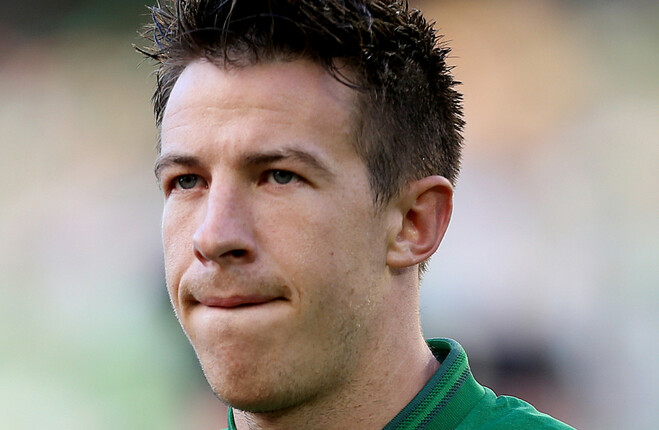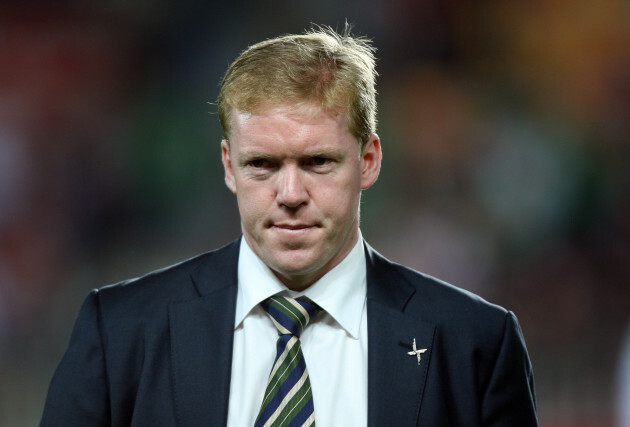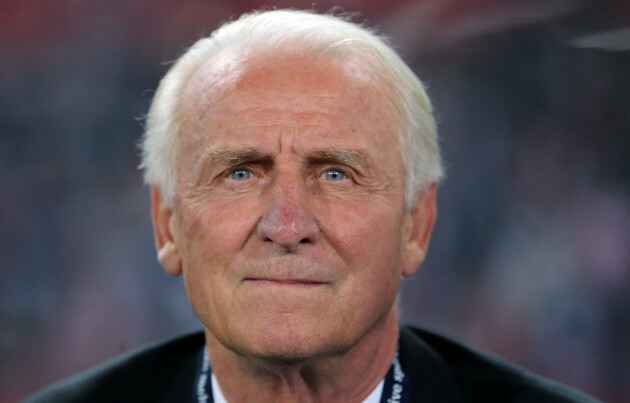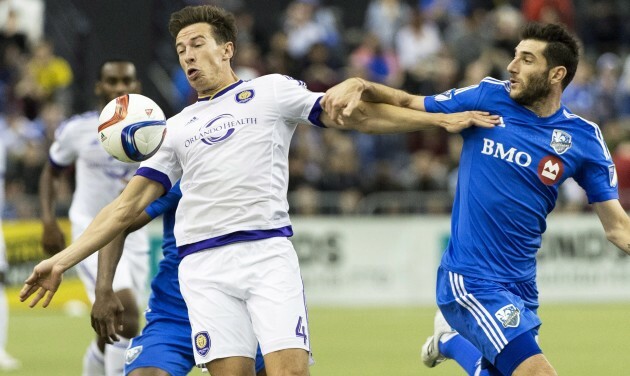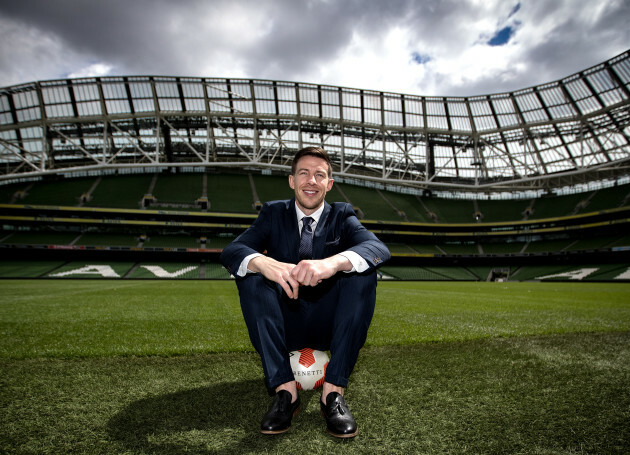SEAN ST LEDGER acknowledges that he is the answer to a classic pub quiz question: who scored Ireland’s only goal at Euro 2012?
The defender joined Ronnie Whelan and Ray Houghton as the only Irish players to have scored at the tournament proper up to that point, while Wes Hoolahan and Robbie Brady have since added their names to that list.
It was a quirky fact amid a career in which St Ledger rarely took the conventional route.
He started his career at Peterborough under the tutelage of Dan Ashworth, now the Director of Football at Brighton.
In his early teens, he was considered small and consequently dropped down an age group to play with footballers closer in size.
“I still was never huge for a centre-back, but it wasn’t until I was 16 or 17 that I started to really grow,” he tells The42. “But I was lucky that I had coaches and a club that understood this.”
As a youngster, St Ledger failed to make a positive enough impression at an Ireland U21 camp and was never selected at that level.
“I thought ‘that’s my time, it’s over. If I can’t get in the U21 team, I’m never going to reach senior-level.’”
Yet St Ledger was still only 21 when he earned his first squad appearance.
The defender was born in Birmingham but qualified to represent Ireland through his grandparents from Carlow.
In August 2006, St Ledger had only just earned a move to Championship side Preston, after impressing at Peterborough, when he answered Steve Staunton’s call, ahead of a Euro 2008 qualifier against Germany.
Looking back now, St Ledger sees the experience he accrued at international level as invaluable: “I always thought when I went back into a club environment in training, I was better. Not only because I was playing with great players, but the ones I was training with day in day out — Robbie Keane, I remember one training session we were doing one-v-ones, he put the ball through my legs when he was shooting and he purposely did it. And I’d never come up against that in training. I always know that when you go to block a shot, he would [try to] put it through my legs and into the bottom corner.
“So every training session was a learning environment, playing alongside Richard Dunne, with Shay Given behind me.
“I remember watching Shay on Match of the Day. Just the positive reinforcement, the confidence he gave you, it made you feel six foot 10.”
But despite initially catching Staunton’s eye, St Ledger would have to wait nearly three years to make his international debut.
By then, Giovanni Trapattoni was in charge, as the Italian blooded the Preston star in a 1-1 draw with Nigeria at Craven Cottage.
The former Juventus and Bayern Munich coach evidently took a liking to St Ledger, as he became a lynchpin of the team under the Italian, with all bar one of his 37 caps coming during the Trapattoni era.
Like St Ledger in a physical sense, Ireland were considered small on the footballing map and needed to punch above their weight at international level, which they often did in those early years of the veteran coach’s reign.
Among the highlights of the player’s career was a goal to put Ireland 2-1 up against Italy in the dying minutes of a crucial World Cup qualifier at Croke Park, though it was marred by the concession of a late equaliser.
He was part of an Irish team desperately unlucky not to qualify for the 2010 World Cup, in a game that was decided by an infamous Thierry Henry handball that was missed by officials in the lead up to the pivotal goal.
The Boys in Green would endure similar misfortune two years later, when after ending Ireland’s 24-year wait to reach the Euros, they were paired in a formidable group alongside Croatia, Spain and Italy, with the latter two the eventual finalists in that tournament.
There was also the sense that, as St Ledger suggests, Ireland had “peaked” two years earlier, with players such as Robbie Keane, Damien Duff and Shay Given having seen better days by 2012.
“I guess when you get drawn into a group with Croatia, Spain and Italy, you knew it was always going to be very difficult.
“We had played those teams recently [before the Euros], Croatia specifically. And the difference from the friendly in the actual game, the tempo and intensity almost had increased by 100%. And obviously, we played Spain and we had played Italy in recent times and the tempo had increased even more.”
And although the tournament was largely a damp squib from an Irish perspective, when St Ledger cancelled out Mario Mandžukić’s early opener in the first match, supporters briefly dared to dream, as it looked like Trapattoni could be set to pull off another managerial masterstroke.
“I look back at the goal now, it’s one of the highlights and one of the moments that people remember most and I guess it comes up in trivia quizzes.
“In my career, playing for my country, playing for Ireland was certainly the highlight.”
The esteem in which St Ledger was held by Trapattoni was clear when you consider that a player as talented as John O’Shea was often asked to play right-back to accommodate both the Preston man and Richard Dunne in the Irish side.
“It didn’t really matter then who came into the team. Sometimes it was Darren O’Dea and Richard Dunne, sometimes it was Darren O’Dea and me, and sometimes it was Richard Dunne and me,” he adds.
“We were all fully aware of our roles and responsibilities, not just individually but also as a team.
“We were really well drilled, so the personnel didn’t really matter too much. Whoever came in could still do their jobs.
“It wasn’t the fast, free-flowing stuff that you see sometimes now. But we were really effective and successful.
“We were close to going to the World Cup in South Africa and we obviously went to Poland. For the people of the country, the moments that they did have there and afterwards in France, they’re memories that live with people forever.
“Sometimes, it’s that old question: what would you prefer? To play fantastic football and be ineffective, or win games.”
And St Ledger adds that Trapattoni also had a big effect on him as an individual.
Despite never playing in the Premier League, St Ledger worked with several high-profile coaches, including one former and one current England manager. And he rates Trap as highly as any of them.
“The clubs that he managed, he had an aura. So when he stepped into the room, I guess you knew you were in the presence of a great.
“And he gave me great confidence to go and express myself. For my club side, I remember I always used to step forward with the ball. There was a particular game for Ireland, it was 0-0. He said to me at half-time, ‘step forward with the ball as you do with your club’. And because he picked me consistently with Richard, that also gave me confidence. With the drills in training, I had a great relationship with him and Marco Tardelli and just the organisation, the defensive side was fantastic.
“Whether he was the best, I guess each manager had different strengths. For instance, Gareth Southgate at Middlesbrough, fantastic man-manager. You always felt like he cared about you as a person, as much as a footballer. He’d often ask questions about how you were.
“Obviously, we had Sven Goran-Eriksson [at Leicester]. He didn’t take too much of the training. But he’d leave you out of the team and I guess with most managers, you’d be quite angry and frustrated. But you never would be with him, he was just such a nice guy. And he was maybe the first manager I had where you had to build from the back and there was a structure that was in place with the coach.
“And that was at the end of my career and now you see building through the thirds, it’s almost a must.”
Following the highs of qualifying for the Euros, it quickly unravelled for Trapattoni and co. He stepped down as a result of a disappointing 2014 World Cup qualifying campaign, with a 6-1 loss at home to Germany — a match St Ledger missed through injury — among the major low points.
And St Ledger soon faded from view after Trapattoni stepped aside, with his last cap coming in Martin O’Neill’s second game in charge, a 0-0 draw in Poland.
By then, the player was approaching his 30s and starting to suffer serious injury problems.
After stints at Leicester and briefly Ipswich Town, he wanted a change of scenery and joined Florida-based Orlando City in 2015.
But the centre-back continued to be hampered by injuries, making 27 appearances in two years Stateside, linking up with fellow Irish international Kevin Doyle at Colorado Rapids, once his short-lived spell in Orlando came to an end.
“I had meniscus surgery at Preston, and at that point, they trimmed meniscuses, whereas now, the technology has moved on and they try to repair them.
“When I moved to America, my knee was swelling more. I had loose particles in my knee and basically, my knee was almost worn down. My knee was bone on bone, whereas if they possibly repaired it with the new technology, I might have had a longer career. Then obviously before the second surgery in America, my knee was swelling up pretty badly. The surgeon said that I probably would need to retire ‘if this doesn’t work’. Then I did rehab at the club. My contract came to an end. But I was like: ‘Right, I can do this.’ I went to Germany and did the rehab there. I literally couldn’t jump over a hurdle on my right leg. Then the guy was like: ‘How do you expect to jog if you can’t perform that action?’ So I continued rehabbing.”
St Ledger made one last attempt to revive his career, lining out for Solihull Moors and then Guiseley in the National League. He enjoyed a short spell as caretaker manager with the latter but made just seven appearances before opting to officially hang up his boots in 2018.
“It was more out of determination on my part. The surgeon said: ‘You can’t play.’ But I thought I could. And I eventually did. Listen, it was at conference level. I was just happy that after all that work, the money spent to do the rehab was worth something. And then I was able to finish football on my own terms really, just because my knee was still swelling.”
St Ledger admits to finding the transition to becoming an ex-player “really tough”.
“Maybe because when I was having the surgery in America, in no shape or form did I think that I would have to retire. I thought I would have the surgery like the first time and be back in 6-8 weeks. I remember coming back and training. My knee was still sore. It was the same pain that I had before the surgery. I knew something wasn’t right and then continued to strengthen the muscles around my knee, the glutes. I was still getting the pain, my knee was still swelling. That’s when I knew I was in trouble and I went to see the surgeon again.
“I was like, if this doesn’t heal, there is another form of surgery where, if you break your leg, they straighten it to take the pressure off the outside of the meniscus. The rehab was 12-16 months and I was 31 or 32 at that point, thinking it’s really going to take its toll on me. I had previous injuries and I thought they had taken a toll on my body. I probably wasn’t the same as I was. So you realise with the experience that it is going to be difficult [to continue playing].”
However, his fleeting experience with Guiseley gave him a taste for the coaching side of the game. Since then, he has become involved with Ireland U15s, undertaking a part-time role in manager Jason Donohue’s backroom staff. For this job, he can impart some of the wisdom he acquired during his playing career.
“I played with Jamie Vardy, who didn’t make his Premier League debut until 27. So even if you don’t get into the squad at U15 with the Republic of Ireland, it’s still never too late,” he says. “Continue to do the work, because I feel like I’ve been in that position before.
“Everybody’s different. Some people are late developers, some develop early. But I sometimes think the lads that have had it more difficult at a younger age and are maybe smaller physically, they’ve suffered some form of trauma and later on, have learnt and got stronger from that trauma and it could see them get into the first team.”
St Ledger remains a popular figure at Leicester City, where he spent four years as a player. His contacts there helped secure what was initially a part-time job, but he has since risen to become a senior scout at the club.
As a coach, St Ledger maintains the same attitude he possessed as a player, which is to aim as high as possible. There may be people unsure whether he can make the grade as a top-level manager, just as certain onlookers would surely have doubted whether a once-small 15-year-old would be good enough to represent his country at a major tournament.
“I would like to go and manage in the Premier League, manage Ireland at some point,” he adds. “I’m probably far away from that, but you just never say never. There’s so much uncertainty in football, it’s so unpredictable, you just never really know what’s around the corner. So I just need to keep working hard, trying to improve my knowledge, because the game is evolving all the time, I just have to keep up with it.
“Aim for the stars and land on the clouds maybe. You always have to strive to be the best that you can be. If it’s not being a Premier League or international manager, then what can it be? Just try to be the best you can be and I think that with hard work, you always get rewarded for it at some point. It might not necessarily be straight away, but the world has a funny way of working sometimes and eventually, you will have that success.”
